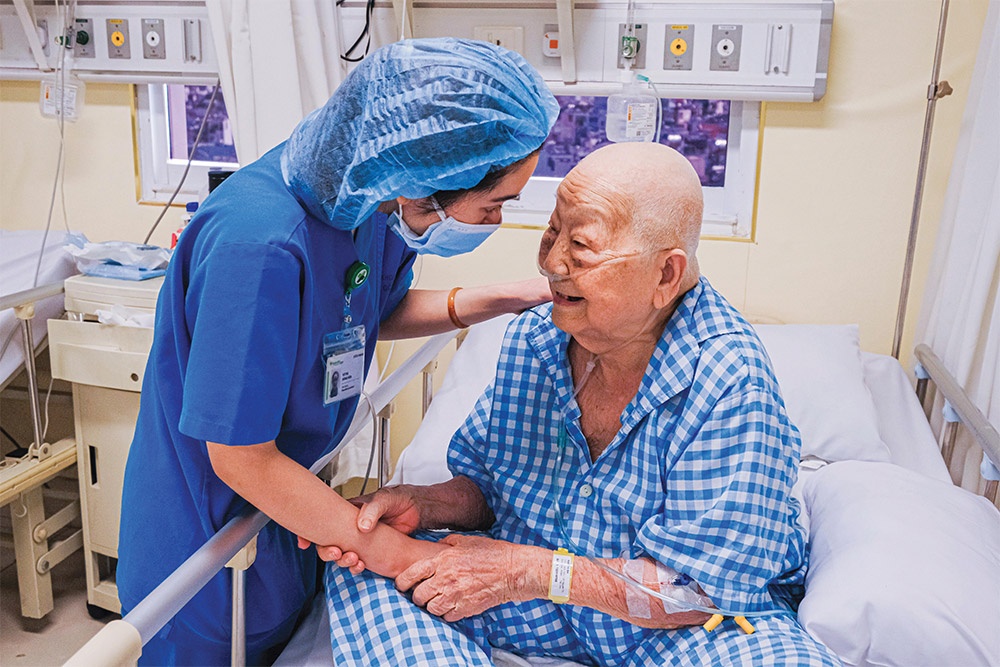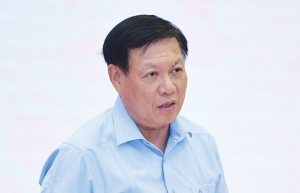“Irreplacable” drugs hard to come by
 |
| Some drugs for major surgical treatment currently cannot be purchased in an efficient manner, Photo Le Toan |
More than three months after the Ministry of Health (MoH) issued four new circulars aiming to deal with problems in bidding of drugs and medical supplies to better ensure supply, medical establishments still face challenges.
Dr. Duong Duc Hung, director of the Viet Duc Hospital in Hanoi, said that the hospital lacks some kinds of drugs because it cannot bid. Patients have to buy them from elsewhere, while doctors have to reduce operations.
“These are irreplaceable drugs, significant in surgical treatment but currently cannot be purchased,” Hung admitted, adding that the drugs that are lacking include albumin and gamma globulin. “The situation is similar in other public hospitals, so we cannot borrow them.”
He blamed the situation on the fact that the hospital called for bids for these drugs, but no pharmaceutical company or distributor participated in the bidding. Meanwhile, this is a specific drug that is well-needed in clinical practices, especially for seriously ill patients and organ transplant patients.
The hospital has been trying to resolve this situation by both calling for bids and regulating the surgery schedule. On average, the hospital conducts 270-300 surgeries and 30-40 emergency surgeries every day. Lacking anaesthetics, the hospital reduced surgical sessions and delayed not serious ones, while ensuring cancer surgeries, emergency treatments, and organ transplants from brain-dead donors.
A similar situation is also reported at the K Hospital in Hanoi, where many patients have to buy drugs and medical supplies at drug stores outside the hospital. Nguyen Linh, 60 years old living in the central province of Nghe An, said that he had to spend nearly VND10 million ($400) on buying medical supplies such as needles and scalpels himself during a week-long treatment at the hospital.
Although some problems have been solved thanks to the Law on Public Procurement and accompanying documents, many hospitals still cannot bid due to barriers such as a lack of supply.
On August 1, Nguyen Hai Nam, deputy chief of office of the Ho Chi Minh City Department of Health, said, “Patients have to wait or go to Hue, Hanoi, or even abroad for PET/CT scans which increases costs, wastes time, and affects the quality of treatment.”
According to local health authorities, the shortage of radioactive drugs in cancer diagnosis and treatment has occurred many times in Ho Chi Minh City. In 2022, PET/CT machines at the People’s Hospital 115, Military Hospital 175, and Oncology Hospital were unavailable due to this shortfall.
In the central region, more expectations about changes are also urged. Pharmacist Thao Nguyen from the Quang Khoi General Hospital said, “The new rules are yet to make many impacts on private healthcare facilities, but there are certain advantages and disadvantages. Specifically, public bidding helps hospitals, including private ones, access drugs at the best prices, bringing benefits to patients.”
She admitted that winning bidders often give priority to supplying drugs to state-run hospitals, especially essential drugs, emergency drugs, and infusion fluids. “Therefore, there is not enough supply of some pharmaceuticals to private health facilities. Worse still, for some winning drugs and medical supplies, private ones cannot buy at the lowest prices, but higher than the winning price. As a result, patients have to pay the difference.”
While the situation is still ongoing, the MoH still said that the shortfall of pharmaceuticals and medical supplies is only taking place at some health facilities in particular localities.
Nguyen Tuong Son, director of the MoH’s Department of Planning and Finance, said that the ministry has organised three conferences to guide bidding for medical facilities according to the new regulations. Currently, bidding is assigned to medical facilities, only some types of centralised procurement categories are implemented by the National Centralised Drug Procurement Centre.
According to Son, a decree detailing some regulations in the Law on Public Procurement, which took into effect from this January, provides comprehensive guidance on the building of bidding packages. Some hospitals choose low-pricing bids, while there are guidelines that if there are many bidding prices, they can take the average price or the highest price that is suitable for their financial capacity.
“The failure due to low-pricing bids is because hospitals did not research market prices and make bids in a reasonable manner,” Son said.
 | Solutions for shortfall of drugs and medical supplies are ready There are two essential elements in procurement of drugs and medical supplies at health facilities. The first is policies, which are relevant documents such as decrees and circulars related to the procurement of drugs and medical supplies. The second is implementation at localities and medical facilities. |
What the stars mean:
★ Poor ★ ★ Promising ★★★ Good ★★★★ Very good ★★★★★ Exceptional
 Tag:
Tag:
Themes: Healthcare Platform
- Hanoi intensifies airport monitoring amid Nipah disease risks
- Cosmetics rules set for overhaul under draft decree
- Policy obstacles being addressed in drug licensing and renewal
- Sanofi, Long Chau Pharmacy relaunch medicine blister pack collection initiative
- Takeda Vietnam awarded for ongoing support of Vietnam’s sustainability efforts
Related Contents
Latest News
More News
- State corporations poised to drive 2026 growth (February 03, 2026 | 13:58)
- Why high-tech talent will define Vietnam’s growth (February 02, 2026 | 10:47)
- FMCG resilience amid varying storms (February 02, 2026 | 10:00)
- Customs reforms strengthen business confidence, support trade growth (February 01, 2026 | 08:20)
- Vietnam and US to launch sixth trade negotiation round (January 30, 2026 | 15:19)
- Digital publishing emerges as key growth driver in Vietnam (January 30, 2026 | 10:59)
- EVN signs key contract for Tri An hydropower expansion (January 30, 2026 | 10:57)
- Vietnam to lead trade growth in ASEAN (January 29, 2026 | 15:08)
- Carlsberg Vietnam delivers Lunar New Year support in central region (January 28, 2026 | 17:19)
- TikTok penalised $35,000 in Vietnam for consumer protection violations (January 28, 2026 | 17:15)




















 Mobile Version
Mobile Version